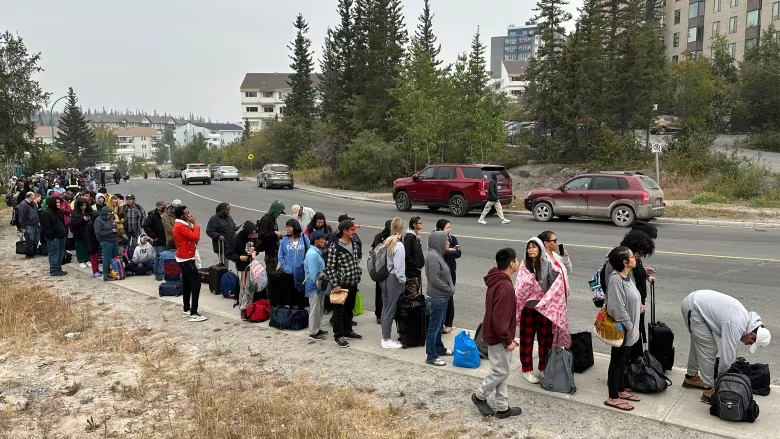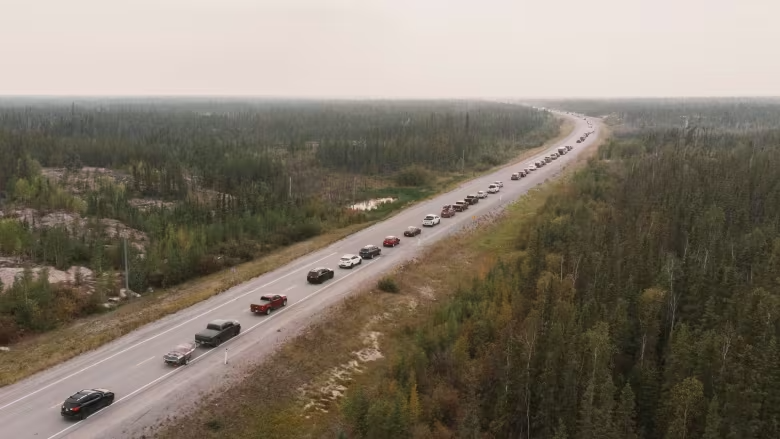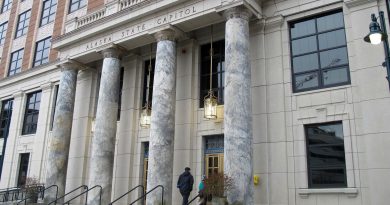Media’s role a balancing act as N.W.T.’s next fire season looms

Most of Yellowknife’s media covered last year’s firefighting efforts from outside the evacuation zone
What is the N.W.T. media’s role in covering an evacuation?
It’s one of the questions being examined by the City of Yellowknife, as wildfire season approaches and the city’s review of last year’s evacuation continues.
The majority of Yellowknife’s media was not present in the city after the evacuation order was issued last August. Most left with the general public.
To some who spoke with CBC News, the media’s responsibility is to be present and document the major events of climate change firsthand — but only with proper gear and training. To others, little is to be gained from being present and the more likely scenario is the media using up precious resources.
Rebecca Alty, Yellowknife’s mayor, said that is a tough balancing act for an area under an evacuation order.
She said the media does have an important role, but with last year’s evacuation reaching international news outlets, there would need to be limits.

“Is it every media outlet in the world?” she said.
“Or could it be done by a couple journalists that shared the news?”
Alty said journalists with proper safety training would make the situation safer, but there’s still a limited amount of food and medical care available under an evacuation order.
Cabin Radio
Throughout Yellowknife’s evacuation, residents tuned into media for daily wildfire updates. One Yellowknife outlet, Cabin Radio, published live blogs and up-to-the minute updates — an approach that drew wide praise from within the territory and across Canada.
Ollie Williams, Cabin Radio’s editor, led that coverage from hundreds of kilometres away in Fort Simpson.
“There are, frankly, as far as I can tell, very few reasons for Cabin Radio to be at the scene of a wildfire,” he said.
Williams said he received feedback from his audience, who appreciated coverage of highway conditions, how to access financial resources and a sense of when they could come home.

“All of those questions are the ones that we spent most of our days answering, as they evolved over time,” he said.
During Yellowknife’s evacuation, there was a prevalent online rumour that mass looting was taking place while the city was empty. Despite the police repeatedly making public announcements that this was not the case, that there were isolated incidents but it was not a widespread issue, the rumours continued.
Williams said he doesn’t think having a reporter on the scene would have made much of a difference.
“Short of driving around every residential area yourself and then telling everyone, ‘Don’t worry — I’ve drove around the whole of Yellowknife and nothing has been looted,’ would you be sure?”
Williams said there are situations where journalists do need to be present in a dangerous situation.
But he said he would never put one of his reporters in that scenario who wasn’t prepared for it.
Wildfire training
Jesse Winter, a freelance photographer and journalist based in B.C., had the unique experience of being embedded with a B.C. wildfire crew last year and covered them from the fire line.
He described this as sort of an unofficial pilot project B.C. was testing out. He won the CJF-Edward Burtynsky Award for Climate Photojournalism for his coverage of this.
In order to earn this access, he completed a significant amount of wildfire safety training, to the point he has the same wildfire suppression and entrapment avoidance training as many contractors working with fire crews.
This access came after years of requests for access.
“At the outset, I was like, ‘Why can’t you let me have access, let me show up, it will be fine,'” Winter said, but over time he understood why.
“You might only have one road in, one road out … If you do something wrong or you get into trouble on that road, not only are you potentially causing a problem for yourself, you might also cause a problem for firefighters — they could get trapped behind you if your vehicle gets stuck,” he said.
Winter said it’s important for media to cover effects of climate change directly, instead of relying on government-issued handouts.
“[The public] want to be able to trust that information and to have an independent version of it that they know is independent is going to make them more likely to trust that material, than if it it’s just the same stock images, handout material provided by the fire services and it’s just us regurgitating what they’re saying all the time,” Winter said.
He said, for one thing, it can help people understand the severity of a situation and in some cases recognize that an evacuation is necessary. But it can also help people understand how wildfires are fought.
“There is an increasing lack of public trust,” Winter said of the B.C. wildfire service.
“That’s not entirely the wildfire service’s fault, I think it’s driven by a number of things, not the least of which is just the general explosion of misinformation and disinformation and conspiracy thinking across the board.”
Numerous conspiracy theories have emerged in recent years that the government is purposefully starting fires. Part of this stems from a misunderstanding around preventative measures that firefighters use, such as planned ignitions, also known as back burning. That’s where fire is intentionally used to burn off fuel in the face of an approaching fire to slow it down or contain it.
But with limited access to see and cover these operations, the media faces challenges explaining the procedure to the public. Winter said his access to operations like this can help people understand these processes.
Another issue he said he faced was that often people who lost homes would publicly claim that fire services gave up on protecting their community, when often this isn’t the case.
“I’ve certainly never seen that, and what I have seen is firefighters risking their lives to defend people and properties,” Winter said.
What training is available to journalists?
CBC North is the largest media outlet in the N.W.T.
When the evacuation order went out, its staff were instructed to leave and those who remained weren’t allowed to work. CBC North reached out to multiple people within CBC for clarity on the rules surrounding evacuations, but it wasn’t clear whether last year’s rule came from the CBC or the territorial government.
Shiral Tobin is the CBC director of journalism for B.C.
When parts of Kelowna, B.C., were under threat from a wildfire that triggered evacuations affecting thousands of people, Tobin said reporters did stay to cover the situation, and they have in previous years in other areas of B.C.
When asked about the training reporters receive to be in these dangerous settings, Tobin said there is a training course available to CBC journalists called Domestic News Safety.
The one-day course has no mentions of wildfire safety in its description.
For the N.W.T., Tobin said she doesn’t have all the details on it, but added the CBC is proactively communicating with officials in all regions to improve access and communication.
“In Canada, we have the legal right to be there and report in the public interest,” she said.
“And when we look at climate change, when we look at the reality of climate change on vulnerable communities, these are things that would go unseen if journalists didn’t have the access that we are entitled to under Canadian law.”
What is the law in the N.W.T.?
CBC North reached out to the territorial government about media access to areas under an evacuation order and whether they are considered essential.
In an unsigned email, N.W.T. cabinet communications wrote that the N.W.T. Emergency Management Act doesn’t define what an essential worker is.
This is the act used in the case of an evacuation order.
“Decisions regarding essential staff will be determined based on the event. Capacity to provide for the safety and quick exit strategies for additional individuals outside of who is needed for the immediate event may be limited,” the email stated.
The territorial government is not opposed to having media on the fire line “as long as the right safety considerations and coordination in line with the ongoing operations have been undertaken” the email states.
“Ultimately, the final decision to have other people around the fire line lies with the incident commander at the site on a case-by-case situation.”
The email said typically an evacuation order is the responsibility of the municipality.
But Alty, Yellowknife’s mayor, said in last year’s case it was the territory who declared the state of emergency. She added if the municipality does declare one in future emergencies, it doesn’t have the same power to restrict travel to or from an area.
“When local government does declare an evacuation order it’s a communications instrument and it can’t be used to force anybody who is unwilling to evacuate during an emergency,” she said.
Related stories from around the North:
Canada: Yukon government to review this summer’s wildfire evacuations in Mayo, Old Crow, CBC News
Norway: Smoke from Canadian wildfires forecast to reach Norway, The Associated Press
Russia: New NOAA report finds vast Siberian wildfires linked to Arctic warming, The Associated Press
Sweden: High risk of wildfires in many parts of Sweden, including North, Radio Sweden
United States: Wildfires in Anchorage? Climate change sparks disaster fears, The Associated Press



